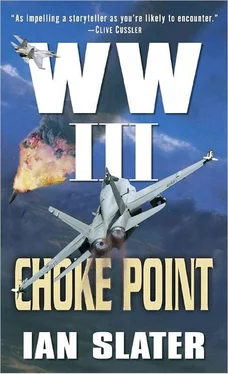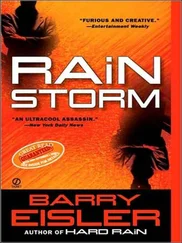In the McCain ’s blue-tile inner sanctums, officers and other ranks quietly wondered aloud whether they’d get a chance to avenge their dead with whatever the boat had left in her vault. Situated deep in the boat, these vaults or fortified ammunition magazines held over four million pounds of “payback.” There was everything down there from sparkling “virgins”—Standoff Land Attack Missiles-Expanded Response, or SLAMERs — to C-model air-to-ground, joint standoff missiles, each armed with a five-hundred-pound warhead with a mid-course accuracy of plus or minus fifty-two feet.
“That would do it,” said an ordnance chief petty officer in the vault. “Got enough here to turn that friggin’ Paygoo—”
“Penghu,” one of his fellow red jackets corrected him.
“Pay goo ,” continued the CPO, looking about at the bright metal “coffins” that contained the “virgins” and the plethora of other land attack and air-to-air ordnance. As yet none of it was armed, but they were ready to go.
“If we get the call,” said the other red jacket.
“We’ll get the call,” the CPO said confidently. “That CNN skirt — one with the hooters — said there’s protest mobs outside the White House demanding we do somethin’.”
“Protests for war. Man, that’s a new one.”
The CPO was still thinking about “Paygoo.” “Could turn it into a parking lot after we’re finished with it.”
“After they fill in the craters, Chief,” said a green-shirted cargo handler.
“Yeah.” The CPO smiled.
“Yeah,” joined in the ordnance tracker. “If we get the order.”
“We’ll get it,” the CPO replied, his tone not brooking any dissent. “Who else is there? We’re Johnny on the spot. Besides, we’re the ones who got whacked.”
Admiral Crowley, anticipating, knowing , he’d soon be called in to launch America’s counterattack against Penghu, retired to what the Navy grandly called his “stateroom” for his daily ten-minute deep-diaphragm breathing, taking advantage of the lull in the normally thunderous roar of the “roof” directly above him. He switched on the TV, pressed “mute,” and lay flat on his back, his pillow under his knees. His son had got him doing the “destressor” routine, the admiral rejecting the idea at first, huffing and puffing about New Age cults.
“It’s not a cult, Dad,” his son had said. “Deep breathing, meditative techniques, are as old as the hills. Will you just try it? You’ll feel better when you do it.”
So the admiral was trying it, but with the door closed. He didn’t want the crew to think he was one of those damn yogis. And it was relaxing him — he could feel the tension of this terrible day abate somewhat. Of course, he had yet to write the families of all the men and women who had died, and that wouldn’t help his tension level. John Cuso had offered to help, and Crowley had accepted. They both agreed there would be no computer-generated crap, or fake “original” signatures. They’d write every one of the letters. Shipmates of those killed would, as usual, be a big help — providing personal details and, where appropriate, a humorous little anecdote to give the letters a more human touch. The padre would help too, but right now he was giving last rites to the dying and preparing for what would be the massive burial at sea.
CNN was doing its entertainment section. “Hollywood celebs caution a rush to judgment” was about one well-known singer-actor who’d apparently “terrified her fans” by threatening to leave America if Bush invaded Iraq. She was now threatening to do it again, a mob of screaming adolescents jabbing the air with “Peace for Penghu” and burning Old Glory near the perimeter rope in Lafayette Park across from the White House. Another smaller but just as vocal group was holding signs promising to pay the singer’s fare to the Penghu. “Neither group,” Marte Price reported, “is clear on exactly where Penghu is.”
The McCain was sailing into night as the show was broadcast, the ship darkened, all lights below rigged for red. Admiral Crowley entered the Combat Information Center and in a voice as calm as ice told John Cuso, “I’ve been thinking, John. If I were terrorists, I’d attack us at first light.”
The incoming secret three-letter-coded message was received by John Rorke’s USS Encino at four hundred feet below the surface of Bashi Strait via the attack boat’s extremely low frequency aerial, which it periodically played out hundreds of yards behind it from a keel-flush integrated spool set on its port side. ELF was secure, being out of view of aerial reconnaissance or other shipping that might be in the area, but it was so slow — its transmission rate this morning one letter every twenty-six seconds — that it was used more often than not to instruct a submarine to come to periscope depth and raise its communications mast in what Encino ’s crew called “the quick pop-out.” At periscope depth, Encino ’s radio mast quickly pierced the sea/air interface and, hopefully before any hostile got a chance to discover the mast by satellite infrared recon, received a three-second burst message from COMSUBPAC HQ in Hawaii.
“Must be urgent,” Encino ’s executive officer said.
“It had better be,” said John Rorke. “I don’t like exposing myself for anything less.”
“How ’bout your honey, Skipper?” quipped the navigator.
Rorke gave an obligatory grin, but when the navigator had said “your” honey rather than “a” honey, it made him inwardly wince, and he saw that the executive officer sensed it. A certain amount of sexual innuendo was part of a Navy man’s life — hell, any man’s life, he thought — but cooped-up men sometimes went over the line. It wasn’t the words they used — Rorke knew the lexicon from Bangor, Maine, to Bangor, Washington, and he was no prude, but he’d found that whenever he’d started getting serious about a woman, the innuendos and unending sexual “jokes” made him feel defensive — no, protective — about her. Alicia evoked in him a respect for women that usually waned when he was simply chasing “poontang.”
The XO had shot the navigator a warning glance, but the latter was busy confirming Encino ’s position, having taken advantage of the brief “pop-out” of the ultrahigh frequency mast to get a fix before the masts were retracted into the sub’s sail. This would allow him to correct for the ship’s inertial navigation system, which, despite twenty-first-century computers’ linked gyroscopes and movement-sensitive accelerometers, could often drift up to 1,700 yards. It was an important correction, enabling the sub’s captain and the handful of officers privy to such information on the boat to know exactly where Encino was. This was especially useful, as Rorke’s mentor, Admiral Jensen, had once said, “if you actually want to hit something with a torpedo.”
Once submerged well below periscope depth, Rorke and the XO watched as two weapons officers from the sub’s missile department simultaneously opened two small green combination safes. Both officers extracted one of a half-dozen black plastic capsules from each, with the number on each of the nontransparent capsules received via the UHF burst message being the same. The code phrase within each of the two extracted capsules was also the same, in this case BLAIR KEITH.
The fact that both capsules contained the same name, as duly witnessed by Rorke and his XO, allowed all four officers to concur that the President’s order for Encino to fire all twelve of its Tomahawk land attack missiles at the target identified only by coordinates was valid. None of the crew would know what the target was, not even the weapons officer, who now, with deliberate yet unhurried pace, punched the given coordinates into his red-eyed firing procedures console. Only the navigator, his computer verifying his manual chart plot, knew the coordinates were for an island off southwestern Taiwan. But he did not know exactly what on that island was being targeted. In this war, as in peacetime patrols, the sub had remained submerged, cut off from the world and news of it for months at a time, night and day distinguished only by whether sections of the sub were rigged for red. Not even the coveted fifty-word familygrams, whose delivery could give the sub’s position away, were being received. Only Rorke, who’d been rushed from the plane to the sub’s dock to take command of Encino after the sub’s captain had unexpectedly died at sea from a heart attack, knew about the present situation between the two Chinas.
Читать дальше












